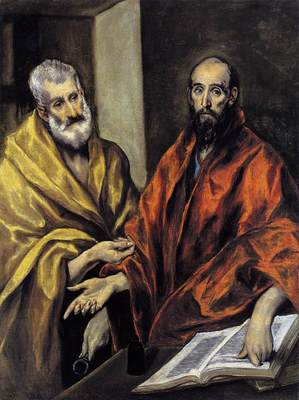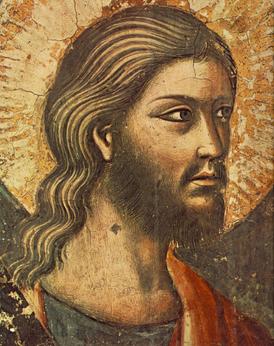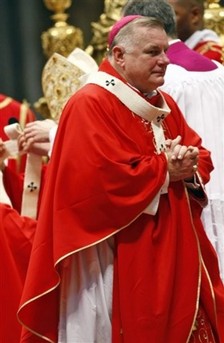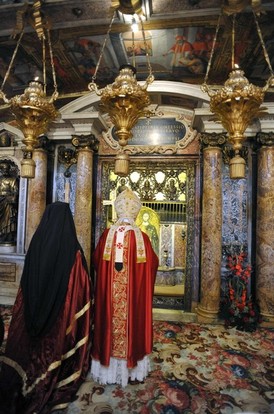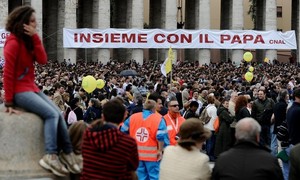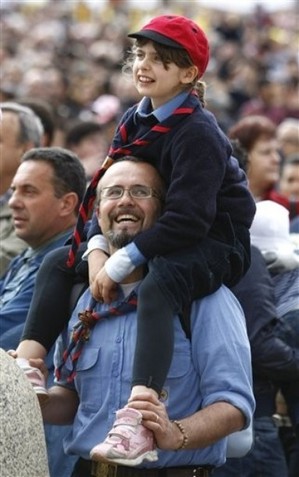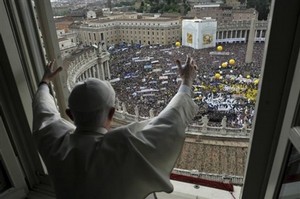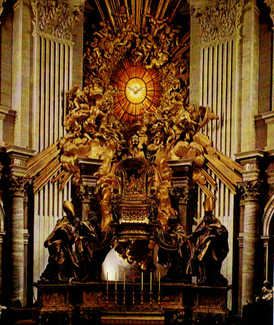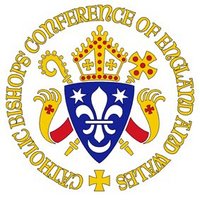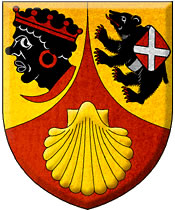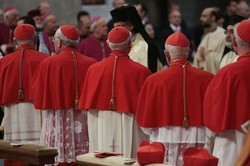 Anna Arco’s article online at the Catholic Herald (of the UK fame) reports that before the consistory of cardinals on November 20, during which the Pope will create 24 new cardinals there will be prayer, reflection and conversation about a number of things but three key topics will be the 10th anniversary of Dominus Iesus, sex abuse crisis and the Ordinariate for Anglicans who desire to enter into full communion the Catholic Church. Other issues to be discussed, but no less crucial to the life of the Church, are religious liberty and the sacred Liturgy.
Anna Arco’s article online at the Catholic Herald (of the UK fame) reports that before the consistory of cardinals on November 20, during which the Pope will create 24 new cardinals there will be prayer, reflection and conversation about a number of things but three key topics will be the 10th anniversary of Dominus Iesus, sex abuse crisis and the Ordinariate for Anglicans who desire to enter into full communion the Catholic Church. Other issues to be discussed, but no less crucial to the life of the Church, are religious liberty and the sacred Liturgy.
Tag: ecclesiology
24 New Cardinals named by Pope Benedict today
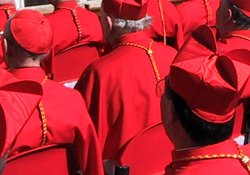 The Pope announced his intention to name 24 new cardinals of the Holy Roman Church today. The public consistory is scheduled for November 20 and it is at this ceremony that the Holy Father’s intention becomes official, becoming members of the College of Cardinals. The new cardinals will have their names in inscribed in the list of “Roman priests” who are deputed to elect the Bishop of Rome.
The Pope announced his intention to name 24 new cardinals of the Holy Roman Church today. The public consistory is scheduled for November 20 and it is at this ceremony that the Holy Father’s intention becomes official, becoming members of the College of Cardinals. The new cardinals will have their names in inscribed in the list of “Roman priests” who are deputed to elect the Bishop of Rome.
This is the third time the Holy Father has created cardinals since his becoming Pope in 2005. Previous consistories were in 2006 and 2007. The new cardinals reflect the various competences the Church relies upon to preach the Gospel and to serve the Church.
- Italians
Archbishop Angelo Amato, SDB, Prefect of the Congregation of Saints
Archbishop Mauro Piacenza, Prefect of the Congregation of Clergy
Archbishop Fortunato Baldelli, Major Penitentiary
Archbishop Velasio De Paolis, CS, President of the Prefecture of the Economic Affairs of the Holy See
Archbishop Paolo Sardi, Vice-Chamberlain of the Apostolic Chamber and Patron of the Order of Malta
Archbishop Francesco Monterisi, Archpriest of the Basilica of Saint Paul outside the Walls
Archbishop Gianfranco Ravasi, President of the Pontifical Council of Culture
Archbishop Paolo Romeo, Archbishop of Palermo
- North Americans
Archbishop Raymond Leo Burke, Prefect of the Supreme Tribunal of Apostolic Signatura
Archbishop Donald William Wuerl, Archbishop of Washington, DC
- Other Europeans
Archbishop Kurt Koch, President of the Pontifical Council for the Unity of Christians
Archbishop Reinhard Marx, Archbishop of Munich and Freising
Archbishop Kazimierz Nycz, Archbishop of Warsaw
- Africa
Archbishop Robert Sarah (Guinea Conakry), President of Cor Unum
Archbishop Medardo Mazombwe, Emertius Archbishop of Lusaka
Archbishop Laurent Monsengwo Pasinya, Archbishop of Kinshasa
- Asia
Archbishop Malcom Ranjith Patabendige Don, Archbishop of Colombo
- Eastern Church
His Beatitude, Patriarch Antonio Naguib, Patriarch of Alexandria of the Copts
- South America
Archbishop Raymundo Damasceno Assis, Archbishop of Aparecida
Archbishop Raul Eduardo Vela Chiribogo, Emeritus Archbishop of Ecudor
- The Over 80 Cardinals
Msgr. Domenico Bartolucci, Emeritus Master of the Sistine Chapel
Msgr. Walter Brandmüller, Emeritus President of the Pontifical Commission of Historical Sciences
Bishop Elio Sgreccia, Emeritus President of the Pontifical Academy of Life
Archbishop Jose Manuel Estepa Llaurens, Emeritus Ordinary of the Spanish Military
Read journalist John Allen’s analysis of the new cardinals: John Allen the new cardinals 2010.pdf
Sacred Duties, Episcopal Ministry: what’s wrong with the US Conference of Bishops
Few people in these parts (in the Eastern part of the USA) know the name Robert F. Vasa except ecclesial-philes like myself, but that’s because he’s on the other side of the country. Never mind. Who could say with honesty that there’s a genuine concern for knowing ecclesial affairs viz. from a person who has little name recognition such as Robert Vasa. That is, until now, who, with some excellent, even controversial ideas, is sure to anger the round heads. Only now Vasa’s thinking is gaining some currency. But let’s give him his just due respect. Robert F. Vasa, 59, is the Bishop of Baker, OR, a priest of the Lincoln Diocese who delivered an extraordinarily good address titled, “Sacred Duties, Episcopal Ministry” on September 16, 2010 at the 2010 InsideCatholic Partnership Award Dinner in Washington, DC, that has not received the attention it deserves.
Pallium Mass 2010: a guarantee of freedom, charity and unity, the Pope reminds
Though they suffered on different days, Saints Peter and Paul are known as one, as Saint Augustine reminds.
In first hearing and then reading the papal homily I noticed some very crucial points for us to reflect upon and to seriously consider: the real persecution of the Church today and the impact on Catholic identity exists not exclusively from outside the Church (a theme the pope has stated before now) but from the faithful’s betrayal of the faith, of Truth. When secularism, not to be confused with secularity, infiltrates the Church the true message of the Gospel is obscured and our hearts are darkened.
As usual on today’s solemn feast of Peter and Paul, Pope Benedict bestowed the pallium, the symbol of theological, juridical and fraternal communion between the pope and a bishop. It is also a symbol of the “fullness of charity and unity.” In seeing the pallium we see, as Benedict says, a symbol of “the guarantee of freedom for the Church’s Pastors and the Communities.” Today, 38 archbishops from around the world received the pallium, including three archbishops from the USA and one from Canada.
The Pope’s exhortation and prayer upon giving the pallium:
To the glory of God and the praise of the Blessed Virgin Mary and of the apostles Peter and Paul, and of the Holy Roman Church, for the honor of the Churches, which have been placed in your care, and as a symbol of your authority as metropolitan archbishop: We confer on you the pallium taken from the tomb of Peter to wear within the limits of your ecclesiastical provinces.
And then
May this pallium be a symbol of unity and a sign of your communion with the Apostolic See, a bond of love, and an incentive to courage. On the day of the coming and manifestation of our great God and chief shepherd, Jesus Christ, may you and the flock entrusted to you be clothed with immortality and glory. In the name of the Father, and of the Son and of the Holy Spirit.
Below is Benedict’s homily for today’s Mass (with my own points of emphasis).
The biblical
texts of this Eucharistic Liturgy of the Solemnity of Saints Peter and Paul, in
their great wealth, highlight a theme that could be summarized thus: God is
close to his faithful servants and frees them from all evil, and frees the
Church from negative powers. It is the theme of the freedom of the Church,
which has a historical aspect and another more deeply spiritual one.
This theme
runs through today’s Liturgy of the Word. The first and second readings speak,
respectively, of St Peter and St Paul, emphasizing precisely the liberating
action of God in them. Especially the text from the Acts of the Apostles
describes in abundant detail the intervention of the Angel of the Lord, who
releases Peter from the chains and leads him outside the prison in Jerusalem,
where he had been locked up, under close supervision, by King Herod (cf. at
12.1 to 11). Paul, however, writing to Timothy when he feels close to the end
of his earthly life, takes stock which shows that the Lord was always near him
and freed him from many dangers and frees him still by introducing him into His
eternal Kingdom (see 2 Tim 4, 6-8.17-18). The theme is reinforced by the
Responsorial Psalm (Ps 33), and also finds a particular development in the
Gospel of Peter’s confession, where Christ promises that the powers of hell
shall not prevail against his Church (cf. Mt 16:18).
Observing closely we note
a certain progression regarding this issue. In the first reading a specific
episode is narrated that shows the Lord’s intervention to free Peter from
prison. In the second Paul, on the basis of his extraordinary apostolic
experience, is convinced that the Lord, who already freed him “from the
mouth of the lion “delivers him” from all evil”, by opening the
doors of Heaven to him. In the Gospel we no longer speak of the individual
Apostles, but the Church as a whole and its safekeeping from the forces of
evil, in the widest and most profound sense. Thus we see that the promise of
Jesus – “the powers of hell shall not prevail” on the Church – yes,
includes the historical experience of persecution suffered by Peter and Paul
and other witnesses of the Gospel, but it goes further, wanting to protect
especially against threats of a spiritual order, as Paul himself writes in his
Letter to the Ephesians: ” For our struggle is not with flesh and blood
but with the principalities, with the powers, with the world rulers of this
present darkness, with the evil spirits in the heavens”(Eph 6:12).
Indeed,
if we think of the two millennia of Church history, we can see that – as the
Lord Jesus had announced (cf. Mt 10.16-33) – Christians have never been lacking
in trials, which in some periods and places have assumed the character of real
persecution. These, however, despite the suffering they cause, are not the
greatest danger for the Church. In fact it suffers greatest damage from what
pollutes the Christian faith and life of its members and its communities,
eroding the integrity of the Mystical Body, weakening its ability to prophesy
and witness, tarnishing the beauty of its face. This reality is already
attested in the Pauline Epistle. The First Epistle to the Corinthians, for
example, responds to some problems of divisions, inconsistencies, of infidelity
to the Gospel which seriously threaten the Church. But the Second Letter to
Timothy – of which we heard an excerpt – speaks about the dangers of the
“last days”, identifying them with negative attitudes that belong to
the world and can infect the Christian community: selfishness, vanity, pride,
love of money, etc. (cf. 3.1 to 5). The Apostle’s conclusion is reassuring: men
who do wrong – he writes – “will not make further progress, for their
foolishness will be plain to all” (3.9). There is therefore a guarantee of
freedom promised by God to the Church, it is freedom from the material bonds
that seek to prevent or coerce mission, both through spiritual and moral evils,
which may affect its authenticity and credibility.
The theme of the freedom of
the Church, guaranteed by Christ to Peter, also has a specific relevance to the
rite of the imposition of the pallium, which we renew today for thirty-eight
metropolitan archbishops, to whom I address my most cordial greeting, extending
with it affection to all who have wanted to accompany them on this pilgrimage.
Communion with Peter and his successors, in fact, is the guarantee of freedom
for the Church’s Pastors and the Communities entrusted to them. It is
highlighted on both levels in the aforementioned reflections. Historically,
union with the Apostolic See, ensures the particular Churches and Episcopal
Conferences freedom with respect to local, national or supranational powers,
that can sometimes hinder the mission of the ecclesial Church. Furthermore, and
most essentially, the Petrine ministry is a guarantee of freedom in the sense
of full adherence to truth and authentic tradition, so that the People of God
may be preserved from mistakes concerning faith and morals. Hence the fact that
each year the new Metropolitans come to Rome to receive the pallium from the
hands of the Pope, must be understood in its proper meaning, as a gesture of
communion, and the issue of freedom of the Church gives us a particularly
important key for interpretation. This is evident in the case of churches
marked by persecution, or subject to political interference or other hardships.
But this is no less relevant in the case of communities that suffer the
influence of misleading doctrines or ideological tendencies and practices
contrary to the Gospel. Thus the pallium becomes, in this sense, a pledge of
freedom, similar to the “yoke” of Jesus, that He invites us to take
up, each on their shoulders (Mt 11:29-30). While demanding, the commandment of
Christ is “sweet and light” and instead of weighing down on the bearer,
it lifts him up, thus the bond with the Apostolic See – while challenging –
sustains the Pastor and the portion of the Church entrusted to his care, making
them freer and stronger.
I would like to draw a final point from the Word of
God, in particular from Christ’s promise that the powers of hell shall not
prevail against his Church. These words may also have a significant ecumenical
value, since, as I mentioned earlier, one of the typical effects of the Devil
is division within the Church community. The divisions are in fact symptoms of
the power of sin, which continues to act in members of the Church even after
redemption. But the word of Christ is clear: ” Non praevalebunt – it will
not prevail” (Matt. 16:18). The unity of the Church is rooted in its union
with Christ, and the cause of full Christian unity – always to be sought and
renewed from generation to generation – is well supported by his prayer and his
promise. In the fight against the spirit of evil, God has given us in Jesus the
‘Advocate’, defender, and after his Easter, “another Paraclete” (Jn
14:16), the Holy Spirit, which remains with us always and leads the Church into
the fullness of truth (cf. Jn 14:16; 16:13), which is also the fullness of
charity and unity. With these feelings of confident hope, I am pleased to greet
the delegation of the Patriarchate of Constantinople, which, in the beautiful
custom of reciprocal visits, participates in the celebrations of the patron
saints of Rome. Together we thank God for progress in ecumenical relations
between Catholics and Orthodox, and we renew our commitment to generously
reciprocate to God’s grace, which leads us to full communion.
Dear friends, I
cordially greet all of you: Cardinals, Brother Bishops, Ambassadors and civil
authorities, in particular the Mayor of Rome, priests, religious and lay
faithful. Thank you for your presence. May the Saints Peter and Paul help you
to grow in love for the holy Church, the Mystical Body of Christ the Lord and
messenger of unity and peace for all men. May they also help you to offer the
hardships and sufferings endured for fidelity to the Gospel with joy for her
holiness and her mission. May the Virgin Mary, Queen of Apostles and Mother of
the Church, always watch over you and especially over the Ministry of
metropolitan archbishops. With her heavenly help may you always live and act in
that freedom that Christ has won for us. Amen.
St Peter is the “absolute and reliable rock,” Fr Giussani told us
Today in Rome members of the various Catholic lay ecclesial movements
like Focolare, Sant’Egidio, Catholic Action and Communion and Liberation are
gathering in Rome as a sign of prayerful solidarity at the Regina Coeli address
of the Pope in Saint Peter’s Square. Indeed, in a sign of friendship and
obedience to the Successor of Saint Peter, Pope Benedict XVI. And as a sign of
this worldwide communion with the Pope, members of Communion and Liberation are
gathering in cities around the world in prayer for the Pope and the Church.
According to news about the event, about 150,000 people flooded Saint Peter’s Square. The Pope said that he was comforted by the “beautiful and spontaneous show of faith and solidarity.”
Here in New York, for example, CL is attending the Mass at Saint Patrick’s
Cathedral with Archbishop Timothy Dolan and will pray the rosary together.
To
understand these pious and fraternal gestures of CL, here are some thoughts of
Monsignor Luigi Giussani that may give a fuller appreciation of the
companionship of faith and brotherhood we all share.
Christianity is an
irreducible event, an objective presence that desires to reach man; until the
very end, it means to be a provocation to him, and to offer a judgment of him.
Jesus said to the Apostles after his Resurrection, “Behold, I am with you always,
even to the end of the world” (Mt 28:20).
Christianity will have a dramatic and
decisive bearing on man’s life only if it is understood in accordance with its
originality and its factual density, which, two thousand years ago, had the
form of a single man. Yet even when He was still living, he also had the face
of people whom he had brought together, and then sent out two by two, to do
what He had been doing, and what he had told them to do; they came back
together and returned to him. Later, united as one, this people went out to the
entire known world to present that Fact. The face of that single man today is
the unity of believers, who are the sign of him in the world, or as Saint Paul
says, who are his Body, his mysterious Body – also called “the people of God” –
guided and guaranteed by a living person, the Bishop of Rome.
If the Christian
fact is not recognized and grasped in its proper originality, it becomes
nothing more than a ponderous occasion for all sorts of interpretations and
opinions, or perhaps even for works; but then it lies alongside of or more
often subordinate to all of life’s other promptings.
(Religious Awareness in
Modern Man, Communio, vol. XXV, n.1, Spring 1998, pp. 134-135)
The supreme
authority is the one in which we find the meaning of all our experience. Jesus
Christ is this supreme authority, and it is His Spirit who makes us understand
this, opens us up to faith in Him and His person. “Just as the Father has sent
me so do I send you.” (See John 20:21) The apostles and their successors (the
Pope and the bishops) constitute, in history, the living continuation of the
authority who is Christ. In their dynamic succession in history and their
multiplication throughout the world, Christ’s mystery is proposed ceaselessly,
clarified without errors, defended without compromise. Therefore, they
constitute the place, like a reliable and effervescent spring, where humanity
can draw on the true meaning of its own existence, probing ever deeper.
What
genius is to the cry of human need, what prophecy is to our cry of expectancy,
so the apostles and their successors are to announcing the response. But just
as the true answer is always perfectly specific and concrete with respect to
the expectancy which is inevitably vague and subject to illusions – so are
they, like an absolute and reliable rock, infallible: “You are Peter and on
this rock I shall build my Church.” (Matthew 16:17ff.)
Their authority not only
constitutes the sure criterion for that vision of the universe and history that
alone explains their (i.e., the universe’s and history’s) meaning; it is also
vital – it steadfastly stimulates a true culture and persistently points to a
total vision. It inexorably condemns any exaltation of the particular and
idealization of the contingent; that is, it condemns all error and idolatry.
The authority of the Pope and bishops, therefore, is the ultimate guide on the
pilgrimage towards a genuine sharing of our lives [convivenza], towards a true
civilization.
Where that authority is not vital and vigilant, or where it is
under attack, the human pathway becomes complicated, ambiguous, and unstable;
it veers towards disaster, even when on the exterior it seems powerful,
flourishing, and astute, as is the case today. Where that authority is active
and respected, the historic pilgrimage is confidently renewed with serenity; it
is deep, genuinely human, even when the expressive methods and dynamics of
sharing lives are roughshod and difficult.
Still today it is the gift of the
Spirit that allows us to discover the profound meaning of Ecclesiastical
Authority as a supreme directive on the human path. Here is the origin of that
ultimate abandonment and of that conscious obedience to it – this is why it is
not the locus of the Law but of Love. One cannot understand the experience of
that definitive devotion that binds the “faithful” to Authority without taking
into consideration the influence of the Spirit, and that devotion often affirms
itself on the Cross of a mortification of the drive of our own genius or our
plans for life.
(The Journey to Truth Is an Experience, Montreal:
McGill-Queen’s University Press 2006, pp. 73-75)
LA gets Gomez as archbishop
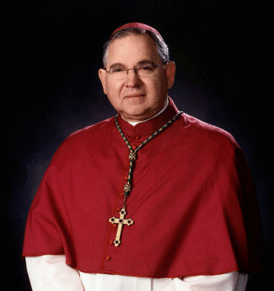 Joyful noise was made upon hearing the appointment of San Antonio’s archbishop, José Horacio Gomez, S.T.D., 58, as the next archbishop of Los Angeles (the 5th).
Joyful noise was made upon hearing the appointment of San Antonio’s archbishop, José Horacio Gomez, S.T.D., 58, as the next archbishop of Los Angeles (the 5th).
The spin doctors (Peters and Palmo) are rejoicing in their common prediction that His Excellency would be chosen by the Holy Father to pastorally lead the Los Angeles Catholics but most of reasonable sense could have predicted this gesture. Of course we know that they have the pulse on the Church in America!
Archbishop Gomez is the first Mexican-American to lead an archdiocese in the USA; and he’s also a former member of the Opus Dei.
Archbishop Gomez faces a sizeable challenge as the new shepherd of LA: 5 million Catholics (of 11 million people) in 3 counties (87,000 sq miles), 288 parishes in 120 cities, 224 grammar schools, 50 high schools. 70% of the Catholics are Latino.
Thanks be to God for Archbishop Gomez’s positive response to the Lord’s call to serve in this way.
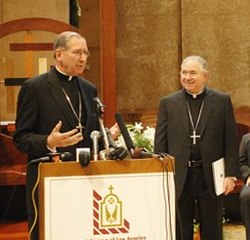 Take a look at some of Archbishop Gomez’s writings:
Take a look at some of Archbishop Gomez’s writings:
The Encounter with Jesus Christ and the New Evangelization of American Culture (2007)
Disciples and Teachers of the Word: Living the Gospel Message of Reconciliation (2007)
Immigration in 21st-Century America: Its Root Causes and the Obligations of Catholic Social Teaching (2008)
To Seek God in the Spirit of Truth (2008)
La predicación y la enseñanza: Evangelization, Education, and the Hispanic Catholic Future (2009)
Men of Brave Heart: The Virtue of Courage in the Priestly Life (OSV, 2009)
Chair of Saint Peter
Whatever you
will bind on earth will be bound in heaven, and whatever you loose on earth
will be loosed in heaven, the Lord said to Simon Peter.
O God, Who having given
Peter, Thy Apostle, the keys of the kingdom of heaven, did bestow on him the
pontifical power of binding and loosing; grant that by the help of intercession
we may be delivered from the bonds of our sins.
On this feast in 2009, Pope Benedict taught the following in an audience:
“This Sunday is also the
feast of the Chair of Peter, an important liturgical feast that highlights the
office of the successor of the Prince of the Apostles. The chair of Peter
symbolizes the authority of the Bishop of Rome, who is called to perform a
special service for the whole People of God. Immediately after the martyrdom of
Saint Peter and Saint Paul, the primacy of the Church of Rome in the Catholic
community was recognized. This role was already attested to in the 2nd century
by Saint Ignatius of Antioch (Letter to the Romans, Pref.: Funk, I, 252) and by
Saint Irenaeus of Lyons (Contra Haereses, III, 3, 2-3). This singular and
specific ministry of the Bishop of Rome was stressed again by the Second
Vatican Council. “Moreover, within the Church,” we read in the
Dogmatic Constitution on the Church, “particular Churches hold a rightful
place; these Churches retain their own traditions, without in any way opposing
the primacy of the Chair of Peter, which presides over the whole assembly of
charity (cf. Saint Ignatius of Antioch, Letter to the Romans, Pref.) and protects
legitimate differences, while at the same time assuring that such differences do
not hinder unity but rather contribute toward it” (Lumen Gentium, 13).
Pope Benedict XVI,
Feast of the Chair of Saint Peter, 22 February 2009
The
Church celebrates today, since the 4th century, the Feast of the Chair of Saint Peter, Apostle. The
Church does not worship church furnishings but the office that was given to the
Apostle Peter by the Lord Himself. This chair, then, is the key to unity among
Christians. Hence, it is not just a chair, but a throne or cathedra, i.e., a
seat of pastoral authority. It is not an authority for temporal affairs or political engagement. It is about preaching, teaching and sanctifying God’s people. These three functions are to lead others to heaven —communio with the Blessed Trinity.
For what purpose does the Church have a feast called the “Chair
of Saint Peter” and how is it connected with unity among Christians? Saint
Cyprian, Carthage’s bishop (d. 258), tells us,
“The Lord says to Peter: ‘I
say to you,’ He says, ‘that you are Peter, and upon this rock I will build my
Church, and the gates of hell will not overcome it. And to you I will give the
keys of the kingdom of heaven: and whatever things you bind on earth shall be
bound also in heaven, and whatever you loose on earth, they shall be loosed
also in heaven.’ And again He says to him after His resurrection: ‘Feed my
sheep.’ On him He builds the Church, and to him He gives the command to feed
the sheep; and although He assigns a like power to all the Apostles, yet He
founded a single chair, and He established by His own authority a source and an
intrinsic reason for that unity. Indeed, the others were that also which Peter
was; but a primacy is given to Peter whereby it is made clear that there is but
one Church and one chair. So too, all are shepherds, and the flock is shown to
be one, fed by all the Apostles in single-minded accord. If someone does not
hold fast to this unity of Peter, can he imagine that he still holds the faith?
If he desert the chair of Peter upon whom the Church was built, can he still be
confident that he is in the Church?“
“There is one God and one
Christ, and one Church, and one Chair founded on Peter by the word of the Lord.
It is not possible to set up another altar or for there to be another
priesthood besides that one altar and that one priesthood. Whoever has gathered
elsewhere is scattering.”
Saint Cyprian is very clear that Christ founded
upon Saint Peter the visible basis of the unity of the Church. Peter does not replace Christ as the
head of the Church. In theological terms this feast notes, observes and
otherwise holds up a primacy given by the Lord to Saint Peter to ensure and preserve
her unity. Saint Cyprian argues:
“With a false bishop appointed for
themselves by heretics, they dare even to set sail and carry letters from
schismatics and blasphemers to the chair of Peter and to the principal Church,
in which sacerdotal unity has its source; nor did they take thought that these
are Romans, whose faith was praised by the preaching Apostle, and among whom it
is not possible for perfidy to have entrance.”
For Saint Cyprian, the unity of the bishops and priests has its source (not only as a
past event but as a living, thriving principle) in the Chair of Saint Peter.
Last year’s blog post may also have some relevant info…
Pope tells bishops of England and Wales to be united in teaching the faith and being a witness to Christ
This last week the Pope has meeting individually and collectively with the bishops of England and Wales. As you know, a bishop is obliged to pray at the tombs of Saints Peter and Paul and to offer a review of the pastoral activities of the diocese he leads to the Pope and to his curia. It is a visit to “the threshold” (ad Limina) to the center of our faith. Over the past years the bishops of Britain have faced some serious challenges–much like the bishops of the USA and Canada– and have not responded effectively enough to certain matters of faith and morals. The British bishops are your typical “old boys” network, a closed group of men sitting on their laurels. Generally speaking the UK bishops are not very unified in their teaching the faith which was a hallmark of Cardinal Murphy-O’Connor; one clear indication of this is the work of Bishop O’Donoghue that was posted here calling for clear catechesis, witness and liturgical practice (read two things here and here). In the Pope’s address to the bishops at the end of their to visit Peter, you can see the matters that concern the pope and the Church at large. The papal address at the end of any visit of an episcopal conference is an interesting thing to read because Rome is a bit more objective in reading the tea leaves than those living in situ. General rule of thumb: if it finds its way into print, then it is important to recall. Plus, the Pope is rather subtle in his addresses such that you have to read between the lines. And you may ask why is this text important for North America. Catholics on both sides of the Atlantic face the very same issues when it comes to proposing the faith, moral living, ecumenism and sacramentality. What the Pope told the UK bishops is to be applied in the USA: the old way of doing things has ended. All but 2 paragraphs of the address are given here with my own emphasis on certain points.
I welcome all of you on your ad Limina visit to Rome, where you have come to venerate the tombs of the Apostles Peter and Paul. I thank you for the kind words that Archbishop Vincent Nichols has addressed to me on your behalf, and I offer you my warmest good wishes and prayers for yourselves and all the faithful of England and Wales entrusted to your pastoral care. Your visit to Rome strengthens the bonds of communion between the Catholic community in your country and the Apostolic See, a communion that sustained your people’s faith for centuries, and today provides fresh energies for renewal and evangelization. Even amid the pressures of a secular age, there are many signs of living faith and devotion among the Catholics of England and Wales. I am thinking, for example, of the enthusiasm generated by the visit of the relics of Saint Thérèse, the interest aroused by the prospect of Cardinal Newman’s beatification, and the eagerness of young people to take part in pilgrimages and World Youth Days. On the occasion of my forthcoming Apostolic Visit to Great Britain, I shall be able to witness that faith for myself and, as Successor of Peter, to strengthen and confirm it. During the months of preparation that lie ahead, be sure to encourage the Catholics of England and Wales in their devotion, and assure them that the Pope constantly remembers them in his prayers and holds them in his heart.
Your country is well known for its firm commitment to equality of opportunity for all members of society. Yet as you have rightly pointed out, the effect of some of the legislation designed to achieve this goal has been to impose unjust limitations on the freedom of religious communities to act in accordance with their beliefs. In some respects it actually violates the natural law upon which the equality of all human beings is grounded and by which it is guaranteed. I urge you as Pastors to ensure that the Church’s moral teaching be always presented in its entirety and convincingly defended. Fidelity to the Gospel in no way restricts the freedom of others – on the contrary, it serves their freedom by offering them the truth.
Continue to insist upon your right to participate in national debate through respectful dialogue with other elements in society. In doing so, you are not only maintaining long-standing British traditions of freedom of expression and honest exchange of opinion, but you are actually giving voice to the convictions of many people who lack the means to express them: when so many of the population claim to be Christian, how could anyone dispute the Gospel’s right to be heard?
If the full saving message of Christ is to be presented effectively and convincingly to the world, the Catholic community in your country needs to speak with a united voice. This requires not only you, the Bishops, but also priests, teachers, catechists, writers – in short all who are engaged in the task of communicating the Gospel – to be attentive to the promptings of the Spirit, who guides the whole Church into the truth, gathers her into unity and inspires her with missionary zeal.
Make it your concern, then, to draw on the considerable gifts of the lay faithful in England and Wales and see that they are equipped to hand on the faith to new generations comprehensively, accurately, and with a keen awareness that in so doing they are playing their part in the Church’s mission. In a social milieu that encourages the expression of a variety of opinions on every question that arises, it is important to recognize dissent for what it is, and not to mistake it for a mature contribution to a balanced and wide-ranging debate. It is the truth revealed through Scripture and Tradition and articulated by the Church’s Magisterium that sets us free. Cardinal Newman realized this, and he left us an outstanding example of faithfulness to revealed truth by following that “kindly light” wherever it led him, even at considerable personal cost. Great writers and communicators of his stature and integrity are needed in the Church today, and it is my hope that devotion to him will inspire many to follow in his footsteps.
Much attention has rightly been given to Newman’s scholarship and to his extensive writings, but it is important to remember that he saw himself first and foremost as a priest. In this Annus Sacerdotalis, I urge you to hold up to your priests his example of dedication to prayer, pastoral sensitivity towards the needs of his flock, and passion for preaching the Gospel. You yourselves should set a similar example. Be close to your priests, and rekindle their sense of the enormous privilege and joy of standing among the people of God as alter Christus. In Newman’s words, “Christ’s priests have no priesthood but His … what they do, He does; when they baptize, He is baptizing; when they bless, He is blessing” (Parochial and Plain Sermons, VI 242). Indeed, since the priest plays an irreplaceable role in the life of the Church, spare no effort in encouraging priestly vocations and emphasizing to the faithful the true meaning and necessity of the priesthood. Encourage the lay faithful to express their appreciation of the priests who serve them, and to recognize the difficulties they sometimes face on account of their declining numbers and increasing pressures. The support and understanding of the faithful is particularly necessary when parishes have to be merged or Mass times adjusted. Help them to avoid any temptation to view the clergy as mere functionaries but rather to rejoice in the gift of priestly ministry, a gift that can never be taken for granted.
Ecumenical and inter-religious dialogue assume great importance in England and Wales, given the varied demographic profile of the population. As well as encouraging you in your important work in these areas, I would ask you to be generous in implementing the provisions of the Apostolic Constitution Anglicanorum Coetibus, so as to assist those groups of Anglicans who wish to enter into full communion with the Catholic Church. I am convinced that, if given a warm and open-hearted welcome, such groups will be a blessing for the entire Church.
New Cardinals in 2010???
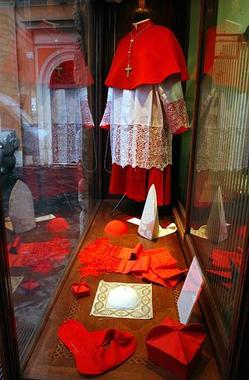 At the moment there are 112 cardinal electors should we have to elect a new pope. The papally imposed number of 120 is usually enshrined in our minds but we can conceivably have more (or fewer) should a reigning pontiff decide the matter. Pope John Paul II confirmed certain norms in a document Universi Dominici Gregis in 1996. Nevertheless, in 2010, 11 cardinals of the Holy Roman Church will lose their ability to vote in a papal conclave because they will turn 80. Their Eminences, Cardinals Ambrozic, Maida, Williams, Herranz, McCarrick, Poupard, DiGiorgio, Daoud, Giordano, Tumi, Pujats. You’ll notice that 2 are from the USA and 1 from Canada.
At the moment there are 112 cardinal electors should we have to elect a new pope. The papally imposed number of 120 is usually enshrined in our minds but we can conceivably have more (or fewer) should a reigning pontiff decide the matter. Pope John Paul II confirmed certain norms in a document Universi Dominici Gregis in 1996. Nevertheless, in 2010, 11 cardinals of the Holy Roman Church will lose their ability to vote in a papal conclave because they will turn 80. Their Eminences, Cardinals Ambrozic, Maida, Williams, Herranz, McCarrick, Poupard, DiGiorgio, Daoud, Giordano, Tumi, Pujats. You’ll notice that 2 are from the USA and 1 from Canada.
Cardinal Walter Kasper speaks on Anglicanorum Coetibus
Edward Pentin of the National Catholic Register penned a piece “Cardinal Kasper on Anglicanorum Coetibus” which dispels much of the misinformation found in both the secular and Catholic media, including certain blogs, about the recent events between Canterbury and Rome. Hopefully, L’Osservatore Romano will provide an English translation of the article they published as a referenced by Mr. Pentin; I am curious to know more. One thing to remember is to interpret these things with charity and understanding. Pray, too, for a profitable meeting between Archbishop Williams and Pope Benedict on Saturday.
